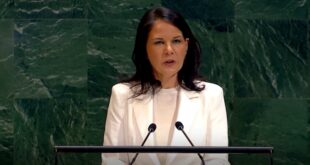The signatories to the landmark Paris climate treaty will meet for two weeks in Germany beginning tomorrow to prepare discussions on how to implement their promises.
The 2017 UN Climate Change Conference opens on Monday (6 November) in the western German city of Bonn, with the aim of launching nations towards the next level of ambition needed to tackle global warming and put the world on a safer and more prosperous development path.
The Conference, coming just two years after the landmark adoption of the Paris Climate Change Agreement, will also further fuel momentum among cities, states, regions, territories, business and civil society in support of national climate action plans, the internationally-agreed temperature goal and the wider objectives of the 2030 Agenda for Sustainable Development.
Extreme Weather Brings Fresh Urgency
Presided over by Frank Bainimarama, the Prime Minister of Fiji and the first small island developing state to hold this role, the conference comes against a backdrop of extreme weather events that have devastated the lives of millions of people in places like Asia, the Americas and the Caribbean.

“The human suffering caused by intensifying hurricanes, wildfires, droughts, floods and threats to food security caused by climate change means there is no time to waste,” said Mr Bainimarama, who takes over as President of the COP23 [the informal name for the 23rd Conference of the Parties to the United Nations Framework Convention on Climate Change (UNFCCC)] conference from Morocco during the opening.
“We must preserve the global consensus for decisive action enshrined in the Paris Agreement and aim for the most ambitious part of that target – to limit the global average temperature rise to 1.5 degrees above that of the pre-industrial age,” he said.
“Wherever we live, we are all vulnerable and need to act. Fiji is helping build a Grand Coalition for decisive, coordinated action by governments at every level, by civil society, the private sector and all citizens on earth. That’s why we installed an ocean-going Fijian “drua” canoe in the entrance here to remind everyone of the need to fill its sail with collective determination to make COP23 a success and confront the biggest challenge humanity has faced,” he said.
COP23 in Bonn will respond to that call with new progress and initiatives in the two critical and inter-linked areas of action:
Governments working to increase climate action under the terms of the Paris Agreement and the UN Climate Change Convention
Showcasing, fostering and launching new and expanding global climate action initiatives by all actors with a view towards better coordination that aligns efforts in more efficient, effective and transformative ways.
Patricia Espinosa, UN Climate Change Executive Secretary, said: “COP23 in Bonn will show to the world the two faces of climate change—firstly positive, resolute, inspiring momentum by so many governments and a growing array of cities and states to business, civil society leaders and UN agencies aligning to the Paris Agreement’s aims and goals”.
“Secondly, the reality check. The thermometer of risk is rising; the pulse of the planet is racing; people are hurting; the window of opportunity is closing and we must go Further and Faster Together to lift ambition and action to the next defining level, “she said.
Anticipated Highlights of COP23
The conference is itself a welcome mirror of international cooperation and coordination.
COP23 is organized by Bonn-based UN Climate Change, presided over by Fiji and organizationally and logistically supported by the Government of Germany, the region of North-Rhine-Westphalia and the City of Bonn.
Speakers reflect the broad spectrum of action. Those already confirmed include Marshall Islands President Hilda Heine, Arnold Schwarzenegger, UN Secretary-General António Guterres, Paris Mayor Anne Hidalgo, California Governor Jerry Brown, UN Special Envoy Michael Bloomberg, Astronaut Thomas Pesquet, Unilever CEO Paul Polman, Scotland’s First Minister Nicola Sturgeon, and Solar Impulse Explorer Bertrand Piccard.
Close to 20 country leaders are expected to attend, including President Emmanuel Macron of France and German Chancellor Angela Merkel.
Various transformative initiatives are anticipated including one from the UN on health and small islands; a platform to support engagement with Indigenous Peoples; a wide-ranging Gender Action Plan and the ramping up of a global risk transfer project that aims to deliver affordable insurance cover to an extra 400 million poor and vulnerable people.
© UNFCCC
 THE AFRICAN COURIER. Reporting Africa and its Diaspora! The African Courier is an international magazine published in Germany to report on Africa and the Diaspora African experience. The first issue of the bimonthly magazine appeared on the newsstands on 15 February 1998. The African Courier is a communication forum for European-African political, economic and cultural exchanges, and a voice for Africa in Europe.
THE AFRICAN COURIER. Reporting Africa and its Diaspora! The African Courier is an international magazine published in Germany to report on Africa and the Diaspora African experience. The first issue of the bimonthly magazine appeared on the newsstands on 15 February 1998. The African Courier is a communication forum for European-African political, economic and cultural exchanges, and a voice for Africa in Europe.













